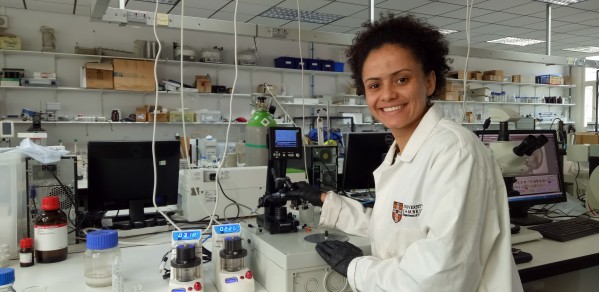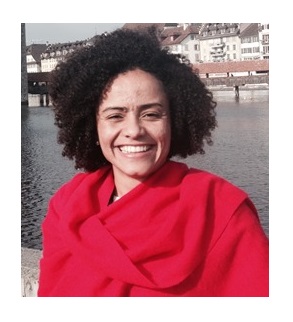
As part of our Women in Engineering series, we meet Livia Souza, PhD student in the Civil Engineering Division.
I love the challenge of understanding something new, to approach it with persistence and new perspectives until I can comprehend it. Although I never excelled at maths or physics at school, I have always enjoyed investigating and trying to understand how things operate.
Livia Souza PhD
Hi Livia, how did you get into engineering and what are you doing now?
I'm a PhD student in the Civil Engineering Division of the Department and I'm supervised by Professor Abir Al-Tabbaa. My project, funded by the Brazilian government, aims to develop microcapsules to be used in self-healing concrete.
Before coming to Cambridge, I studied in my homeland of Brazil where I obtained a B.Sc. in Chemistry and an M.Sc. in Mineral Science and Technology. My B.Sc. dissertation involved the synthesis and characterization of carbon nanofibers supported in CaO. My work took place in the laboratory of Catalysis and Environmental Chemistry, and my thesis was awarded the maximum score of 100/100.
During my M.Sc., I investigated the metal contamination in river and lake sediments near to a former uranium mine affected by acid mine drainage. The isotopic fractioning analyses were performed during my stay at the Department of Catchment Hydrology, UFZ-Halle, Germany. The main results of the research were published in the Journal of Soils and Sediments.
What motivates you?

I love research. I love the challenge of understanding something new, to approach it with persistence and new perspectives until I can comprehend it. Although I never excelled at maths or physics at school, I have always enjoyed investigating and trying to understand how things operate. I enjoy dismantling and reassembling machines in order to gain a better understanding of how the individual components work together.
Why did you choose to study Engineering?
It was a mix of my love for research and the opportunities available to me: the Brazilian government was offering a scholarship, a friend of mine was currently pursuing a PhD in Cambridge and my supervisor needed a PhD student with a background in chemistry. I was open to the opportunity and the opportunity presented itself.
What's it like studying for a PhD at the Department of Engineering?
I couldn't be happier with the outcome. Cambridge has been the perfect place to mature my research skills - to learn when it is time to persevere, or when it is time to change. My project has an enticing proportion of chemistry, new technologies and applicability.
Furthermore, my supervisor gives me the right amount of support and freedom, so that I feel motivated but I'm still able to make my own decisions.
And, more importantly, the flexible nature of PhD life gives me the opportunity to invest in my personal growth. The wide variety of societies in Cambridge allows me to do just that. I have been able to explore dance, yoga, mindfulness, running and the art of pure idleness.
Also, the multicultural environment of the University is very enriching and stimulating.
This article has been edited from the University of Cambridge Women in Engineering website.

